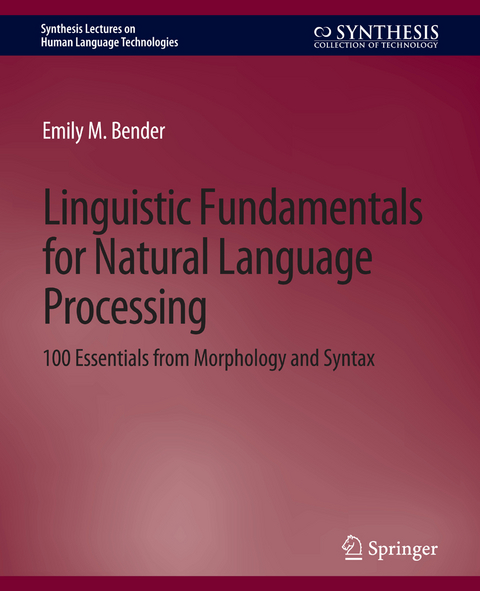
Linguistic Fundamentals for Natural Language Processing
Springer International Publishing (Verlag)
978-3-031-01022-4 (ISBN)
Emily M. Bender is an Associate Professor in the Department of Linguistics and Adjunct Associate Professor in the Department of Computer Science & Engineering at the University of Washington. Her primary research interests lie in multilingual grammar engineering and the incorporation of linguistic knowledge, especially from linguistic typology, in NLP. She is the PI of the Grammar Matrix project, which is developed in the context of the DELPH-IN Consortium (Deep Linguistic Processing with HPSG Initiative). More generally, she is interested in the intersection of linguistics and computational linguistics, from both directions: bringing computational methodologies to linguistic science and linguistic science to natural language processing. Her PhD (in linguistics) is from Stanford University. She has authored or co-authored papers in Linguistic Issues in Language Technology, the Journal of Research on Language and Computation, English Language and Linguistics, the Encyclopedia of Language and Linguistics, and the proceedings of ACL, COLING, IJCNLP, and associated workshops.
Acknowledgments.- Introduction/motivation.- Morphology: Introduction.- Morphophonology.- Morphosyntax.- Syntax: Introduction.- Parts of speech.- Heads, arguments, and adjuncts.- Argument types and grammatical functions.- Mismatches between syntactic position and semantic roles.- Resources.- Bibliography.- Author's Biography.- General Index.- Index of Languages.
| Erscheinungsdatum | 06.06.2022 |
|---|---|
| Reihe/Serie | Synthesis Lectures on Human Language Technologies |
| Zusatzinfo | XVII, 166 p. |
| Verlagsort | Cham |
| Sprache | englisch |
| Maße | 191 x 235 mm |
| Gewicht | 365 g |
| Themenwelt | Geisteswissenschaften ► Sprach- / Literaturwissenschaft ► Sprachwissenschaft |
| Informatik ► Theorie / Studium ► Künstliche Intelligenz / Robotik | |
| ISBN-10 | 3-031-01022-1 / 3031010221 |
| ISBN-13 | 978-3-031-01022-4 / 9783031010224 |
| Zustand | Neuware |
| Haben Sie eine Frage zum Produkt? |
aus dem Bereich


